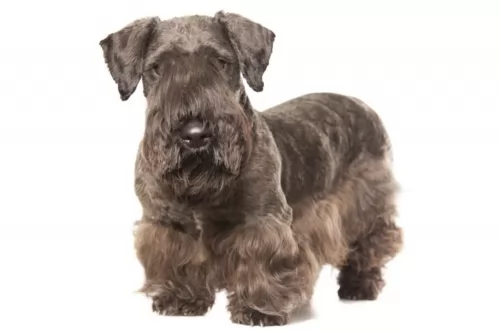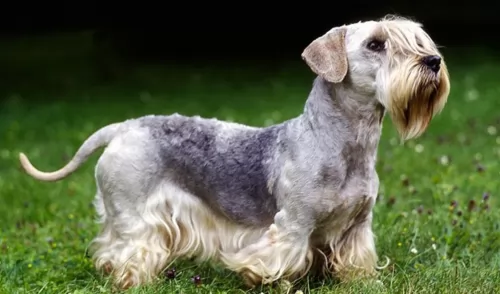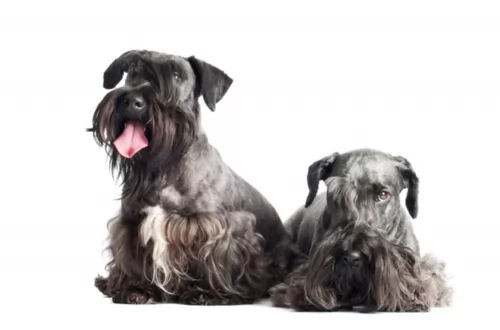 Petzlover
Petzlover Cesky Terrier is originated from Czech Republic but Weimaraner is originated from Germany. Cesky Terrier may grow 43 cm / 16 inches shorter than Weimaraner. Cesky Terrier may weigh 30 kg / 66 pounds lesser than Weimaraner. Both Cesky Terrier and Weimaraner has almost same life span. Cesky Terrier may have less litter size than Weimaraner. Cesky Terrier requires Moderate Maintenance. But Weimaraner requires Low Maintenance
Cesky Terrier is originated from Czech Republic but Weimaraner is originated from Germany. Cesky Terrier may grow 43 cm / 16 inches shorter than Weimaraner. Cesky Terrier may weigh 30 kg / 66 pounds lesser than Weimaraner. Both Cesky Terrier and Weimaraner has almost same life span. Cesky Terrier may have less litter size than Weimaraner. Cesky Terrier requires Moderate Maintenance. But Weimaraner requires Low Maintenance
 Known as the Bohemian Terrier and looking similar to a Scottish Terrier dog, the Cesky Terrier is a dog breed that has been created by Frantisek Horak, in the Czech Republic.
Known as the Bohemian Terrier and looking similar to a Scottish Terrier dog, the Cesky Terrier is a dog breed that has been created by Frantisek Horak, in the Czech Republic.
Horak wanted to breed a type of hunting dog, and in 1949, using both the Scottish Terrier ad the Sealyham Terrier, he bred the two, creating a new breed that would hopefully be a stronger hunting dog.
The Cesky Terrier was shown for the first time in 1959 and was recognized by the Federation Cynologique Internationale in 1963 and in 1993 by the United Kennel Club. It’s a rare dog this, and is the national dog of the Czech Republic.
 The Weimaraner is a German breed also know as the Grey Ghost. He was bred to hunt by royalty in the early part of the 19th century. They went after large game including the bear, boar and deer. Once these large game hunts disappeared, the breed became known for hunting small prey like rabbits, fowl and fox.
The Weimaraner is a German breed also know as the Grey Ghost. He was bred to hunt by royalty in the early part of the 19th century. They went after large game including the bear, boar and deer. Once these large game hunts disappeared, the breed became known for hunting small prey like rabbits, fowl and fox.
They are an all-purpose gun dog, hunting, chasing, tracking, pointing and retrieving. They got their name from the city of Weimar in Germany as a favorite of Karl August, the Grand Duke of Saxw-Weimar-Eisenach who hunted with the dogs. They are believed to have descended from either the St. Hubert Hound and Bloodhound, or the Chien-gris dogs.
The breed did not arrive in the United States until the 1920’s. Before that they were barely known outside the city of Weimar. By the 1950’s they were very popular in the States with President Eisenhower having one at the White House.
 The Cesky Terrer is a longish dog, much like the Scottie and he also has short legs. He is roughly 29ck in height at the withers, is about 43cm in length and weighs anything from 5 to 10kg.
The Cesky Terrer is a longish dog, much like the Scottie and he also has short legs. He is roughly 29ck in height at the withers, is about 43cm in length and weighs anything from 5 to 10kg.
The coat of this dog is long, silky and quite wavy and can be in a number of different shades of gray or a light brown color. Puppies are born black. The soft coat can be kept groomed by clippers or you can take him to have his coat professionally trimmed.
This dog breed has natural drop ears, unlike the Scottie which has erect ears. The tail length is 18-20 cm and low set.
A loyal, quiet and loving family dog, the Cesky Terrier will get on well with children in the home and he is also friendly with other dogs. Just like with any other dog, it will be important to socialize the dog breed at an early age as then he becomes obedient, smart and relaxed. He is a breed which is also easy to train. He also makes a good watchdog.
 A very athletic and elegant breed, muscular and lean, the Weimaraner is built for stamina and speed. They are a very unique looking breed, nick named the Grey Ghost due to the appearance and coloration. The breed has a very short coat that fits like skin over his bone structure. It is smooth and hard and runs from a blue-gray to silver-gray to charcoal-blue. The skin is pink not black, the coat is thin with no undercoat.
A very athletic and elegant breed, muscular and lean, the Weimaraner is built for stamina and speed. They are a very unique looking breed, nick named the Grey Ghost due to the appearance and coloration. The breed has a very short coat that fits like skin over his bone structure. It is smooth and hard and runs from a blue-gray to silver-gray to charcoal-blue. The skin is pink not black, the coat is thin with no undercoat.
They should not be black but they can be a longhaired Weimaraner, according to US AKC Breed Standards. In the AKC standards the tail is docked. This has now been changed in standards around the world as many countries are banning tail docking. They have webbed paws and striking amber, blue-gray or gray eyes. The long haired version can only be produced when both parents carry the recessive gene
 The Cesky Terrier isn’t a small-dog yapper and he will adapt to life in the city or the country. He is a small dog, but he is feisty and sporty and will willingly join you with your jogging or when you go on a walk.
The Cesky Terrier isn’t a small-dog yapper and he will adapt to life in the city or the country. He is a small dog, but he is feisty and sporty and will willingly join you with your jogging or when you go on a walk.
He is intelligent and playful and when you add in characteristics such as being courageous, loving, loyal and feisty, you can see that the Cesky Terrier is guaranteed to make a super family pet.
 The Cesky Terrier is generally a healthy dog, but this breed sometimes suffers from common dog ailments that other breeds also have to contend with.
The Cesky Terrier is generally a healthy dog, but this breed sometimes suffers from common dog ailments that other breeds also have to contend with.
Eye disorders, ear infections, pancreatitis, hip dysplasia and weight gain are just some health issues you might need to be aware of.
Remember that if you want to promote a healthier dog, feeding him a quality diet and taking him immediately to the vet when you suspect a problem can keep him free from common dog illnesses.
Pancreatitis for instances develops when the pancreas becomes inflamed, and this can be brought on by allowing your pet to become obese. There are other reasons for pancreatitis too such as infection. You will see diarrhea, fever and vomiting with your pet as well as discomfort from abdominal pain. It’s a disease which affects smaller dogs more often than larger breeds.
 There are a few conditions and diseases that the Weimaraner is subject to but surprisingly for their size hip dysplasia is rarely one of them. There are prone to
There are a few conditions and diseases that the Weimaraner is subject to but surprisingly for their size hip dysplasia is rarely one of them. There are prone to
Bloat – Gastric torsion when the stomach twists itself and cuts off blood circulation and digestive processes. Bloat is deadly unless caught quickly.
 Cesky Terriers may well be a little bit less active and quieter than other terriers, but they will still need a good dose of exercise. He loves to dig, and if he is bored and doesn’t have a plenty of exercise and games, he will want to dig more and cause the owner a lot of frustration. Take him for daily walks and give him some ball games in the garden.
Cesky Terriers may well be a little bit less active and quieter than other terriers, but they will still need a good dose of exercise. He loves to dig, and if he is bored and doesn’t have a plenty of exercise and games, he will want to dig more and cause the owner a lot of frustration. Take him for daily walks and give him some ball games in the garden.
Cesky Terriers will need brushing down at least twice a week and their coats will need to be trimmed into shape every 8 to 10 weeks or so. You’ll also need to check excess hair inside the ears.
As with any dog breed, you will need to check on his nails so that they don’t grow too long and also brush his teeth 2 or 3 times a week to avoid dental disease.
 1 Feeding the puppy - Feed high quality dog food with high protein but not rich foods. Rich foods cause digestive issues and eating to fast, too soon before or after strenuous exercise do to threat of bloat. Also do not use the raised foot bowls as they hold an even great risk for bloat. Feed puppy 3-4 meals per day.
1 Feeding the puppy - Feed high quality dog food with high protein but not rich foods. Rich foods cause digestive issues and eating to fast, too soon before or after strenuous exercise do to threat of bloat. Also do not use the raised foot bowls as they hold an even great risk for bloat. Feed puppy 3-4 meals per day.
2.Feeding the adult Feed high quality dog food with high protein but not rich foods. Rich foods cause digestive issues and eating to fast, too soon before or after strenuous exercise do to threat of bloat. Also do not use the raised foot bowls as they hold an even great risk for bloat. Feed the adult twice a day.
4. Games and Exercises – This is a very athletic and energetic dog. They need activity and will become destructive without it. They develop separation anxiety very easily. They need both physical and mental stimulation. They are great at agility, course running, field trials and CAT.